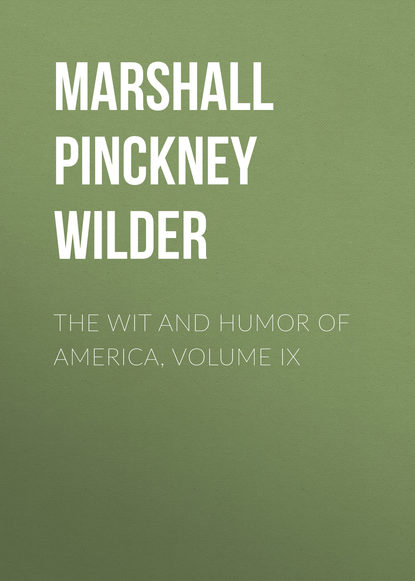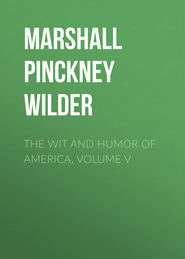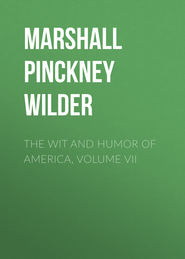По всем вопросам обращайтесь на: info@litportal.ru
(©) 2003-2024.
✖
The Wit and Humor of America, Volume IX
Автор
Год написания книги
2019
Настройки чтения
Размер шрифта
Высота строк
Поля
THE GUSHER
BY CHARLES BATTELL LOOMIS
Of course an afternoon tea is not to be taken seriously, and I hold that any kind of conversation goes, as long as it is properly vacuous and irrelevant.
One meets many kinds of afternoon teas—the bored, the bashful, the intense, and once in a while the interesting, but for pure delight there is nothing quite equals the gusher. She is generally very pretty. Nature insists upon compensations.
When you meet a real gusher—one born to gush—you can just throw all bounds of probability aside and say the first thing that comes into your head, sure that it will meet with an appreciative burst of enthusiasm, for your true gusher is nothing if she is not enthusiastic. There are those who listen to everything you say and punctuate it with "Yes-s-s, yes-s-s, yes-s-s," until the sibilance gets on your nerves; but the attention of the Simon-pure gusher is purely subconscious. She could not repeat a thing of what you have told her a half minute after hearing it. Her real attention is on something else all the while—perhaps on the gowns of her neighbors, perhaps on the reflection of her pretty face—but never on the conversation. And why should it be? Is a tea a place for the exercise of concentration? Perish the thought.
You are presented to her as "Mr. Mmmm," and she is "delighted," and smiles so ravishingly that you wish you were twenty years younger. You do not yet know that she is a gusher. But her first remark labels her. Just to test her, for there is something in the animation of her face and the farawayness of the eye that makes you suspect her sincerity, you say:
"I happen to have six children—"
"Oh, how perfectly dee-ar! How old are they?"
She scans the gown of a woman who has just entered the room and, being quite sure that she is engaged in a mental valuation of it, you say:
"They're all of them six."
"Oh, how lovely!" Her unseeing eyes look you in the face. "Just the right age to be companions."
"Yes, all but one."
The eye has wandered to another gown, but the sympathetic voice says:
"Oh, what a pi-i-ty!"
"Yes, isn't it? But he's quite healthy."
It's a game now—fair game—and you're glad you came to the tea!
"Healthy, you say? How nice. It's perfectly lovely to be healthy. Do you live in the country?"
"Not exactly the country. We live in Madison Square, under the trees."
"Oh, how perfectly idyllic!"
"Yes; we have all the advantages of the city and the delights of the country. I got a permit from the Board of Education to put up a little bungalow alongside the Worth monument, and the children bathe in the fountain every morning when the weather is cold enough."
"Oh, how charming! How many children have you?"
"Only seven. The oldest is five and the youngest is six."
"Just the interesting age. Don't you think children fascinating?"
Again the roaming eye and the vivacious smile.
"Yes, indeed. My oldest—he's fourteen and quite original. He says that when he grows up he doesn't know what he'll be."
"Really? How cute!"
"Yes, he says it every morning, a half-hour before breakfast."
"Fancy! How old did you say he was?"
"Just seventeen, but perfectly girl-like and masculine."
She nods her head, bows to an acquaintance in a distant part of the room, and murmurs in musical, sympathetic tones:
"That's an adorable age."
"What, thirteen?"
"Yes. Did you say it was a girl?"
"Yes, his name's Ethel. He's a great help to her mother."
"Little darling."
"Yes; I tell them there may be city advantages, but I think they're much better off where they are."
"Where did you say you were?"
"On the Connecticut shore. You see, having only the one child, Mrs. Smith is very anxious that it should grow up healthy" (absent-minded nods indicative of full attention), "and so little Ronald never comes to the city at all. He plays with the fisherman's child and gets great drafts of fresh air."
"Oh, how perfectly entrancing! You're quite a poet."
"No; I'm a painter."
Now she is really attentive. She thought you were just an ordinary beast, and she finds that you may be a lion. Smith? Perhaps you're Hopkinson Smith.
"Oh, do you paint? How perfectly adorable! What do you paint—landscapes or portraits?"
Again the eye wanders and she inventories a dress, and you say:—
"Oils."
"Do you ever allow visitors come to your studio?"
"Why, I never prevent them, but I'm so afraid it will bore them that I never ask them."
"Oh, how could anybody be bored at anything?"
"But every one hasn't your enthusiasm. My studio is in the top of the Madison Square tower, and I never see a soul from week's end to week's end."
"Oh, then you're not married."
"Dear, no; a man who is wedded to his art mustn't commit bigamy."








